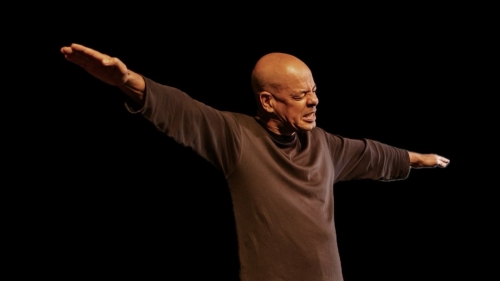
Storyteller Antonio Rocha mimes and narrates the story of the Malaga ship and the Middle Passage in his one-person storytelling performance. The historical story is in part told from the Malaga ship’s point of view. Built in Maine in 1832, the ship was used in the clandestine trafficking of Africans to the Americas, including Brazil, Rocha’s homeland.
You are an award-winning storyteller. Can you walk us through how you achieved this, and what skills or areas of study helped shape your path to success?
I believe the reason why I have received awards is in part due to my fusion of mime and spoken narratives, which create the atmosphere of the story being told on stage. I am not simply telling the audience what happened, but also experiencing it first hand. I am surrendering to the illusion of the narrative physically and verbally. I must see the illusion first. If you don't buy into it first, you cannot expect the audience to do it on their own. When you surrender to the experience of what you are telling, you are inviting the audience to jump in with their imagination and journey through the narrative with you.
I also craft the transitions from scene to scene blending what happened to what is to happen, and by doing so crafting a new now that the audience can experience without noticing we are moving into a new part of the narrative. I want the audience to experience the story, not just listen to it.
What creative techniques do you use to personify a historical ship and convey the brutal reality of the transatlantic slave trade?
The techniques I use I have learned in mime and acting. The mime is raw and organic, used to serve the characteristics of the ship in relation to the water and the turbulent times it sails. I move like a ship and feel like a human in order to anthropomorphize the ship. An audience member recently told me he could feel the salt spray and smell the stench of suffering. My narration takes the audience first to the Maine woods where the trees are being harvested for the shipbuilding industry.
When Malaga is launched in the turbulent North Atlantic, she is experiencing life anew with no idea of what is to come. When she is in the process of trafficking humans, we (the ship and I) come together through time and I explain to her what is going on. She is in a state of shock. As I explain to her what she sees and smells (death and blood), the audience then understands it too. Little by little the ship becomes the storyteller of her journey. She says to me, "Storyteller, I have seen a lot. May I tell you about it? I believe that if we can hear each other through time, so can the people who are here listening"
What do you hope audiences take away from your unique portrayal of The Malaga and its dark history?
There are a lot of details of these dark times that I learned during my research that I had never heard of before. For example, there were so many bodies thrown overboard, over two million during 350 years, it caused sharks to change their migration routes across the Atlantic.
There is a lot of history that has been buried. My intent is not to blame people, nor to make them feel guilty. My hope is that the impact of these facts will help audience members understand that a lot still needs to be done so healing can take place and usher us all to a better quality of life. This cannot be swept under the rug. It happened and still influences us today politically, socially and personally. The history has to be brought to the light so healing can take place. Ancestral trauma is real!
###
"I saw the performance of the Malaga Ship: A Story of Maine and The Middle Passage by Antonio Rocha at the National Storytelling Network Conference in Seattle, WA in 2024. It took my breath away, left me in tears, and with a sense that I had traveled through time to witness the lifecycle of a slave ship.
This story teaches people about the Middle Passage in a unique and unforgettable way. Antonio brought the ship to life and showed the audience, through the ship’s experience of transporting “cargo,” how incredibly cruel and pervasive the slave industry was. Antonio also drew a line from what happened in the 1800s with his own life and with America today, connecting the dots from the sugar industry, the slave industry, and racial inequity in America in 2024. By connecting these various points through history with his own personal experience, he painted a vivid picture for anyone who might not understand how tragedies of the past influence the present."
- Jessica Piscitelli Robinson
Executive Director
Better Said Than Done
